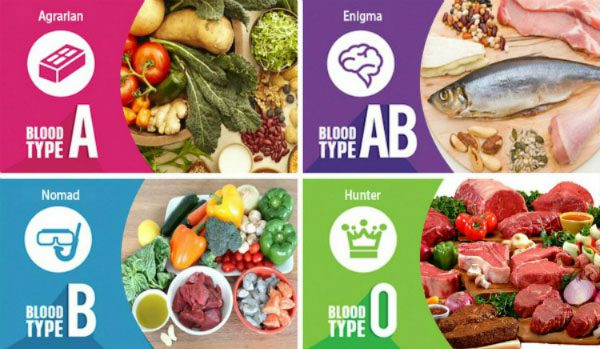Each blood type has its own unique characteristics, making it suitable for different types of foods. Let’s explore which foods are best suited for your blood type!

Foods suitable for each blood type.
Blood Type A
Research indicates that individuals with blood type A may be more susceptible to heart disease, cancer, and diabetes. Therefore, they should follow a healthy diet. If possible, prioritize an organic vegetarian diet, maintain light exercise, and engage in relaxing activities such as yoga. A recommended diet includes limited dairy, focusing on a variety of fruits, vegetables, whole grains, legumes, nuts, and seeds, which are all beneficial for health. Excessive consumption of meat and fish is not advisable.
Blood Type B
People with blood type B generally have a better immune system and digestive health compared to other blood types. However, they are also prone to autoimmune disorders such as chronic fatigue syndrome (CFS), lupus, or multiple sclerosis. It is recommended that individuals with blood type B engage in moderate exercise, maintain a balanced workout routine, and consume a diverse diet. They should include fruits, vegetables, grains, legumes, pork, poultry, fish, eggs, and dairy, but should avoid excessive intake of nuts, corn, wheat, buckwheat, lentils, tomatoes, peanuts, and sesame seeds.
Blood Type AB
Individuals with blood type AB have the most complex body characteristics among the blood types. Studies show that this blood type has a lower allergy rate but may be at risk for heart disease, cancer, and anemia. They should adopt a diet that combines elements from both blood types A and B, such as a vegetarian diet with limited dairy, and include a wide range of fruits, vegetables, grains, nuts, eggs, dairy, fish, tofu, and seafood. However, it is best to limit meat consumption and alternate with a vegan diet for optimal health. Additionally, due to a higher susceptibility to stomach issues, they should avoid caffeine, alcohol, and processed or smoked meats.
Blood Type O
Individuals with blood type O can engage in high-intensity exercise and consume animal protein, but dairy products and grains may pose health issues for them. Foods containing gluten, lentils, kidney beans, corn, and cabbage can lead to weight gain in those with this blood type. Furthermore, people with blood type O are more prone to asthma, allergies, and arthritis. Therefore, they should focus on a diet rich in meat, moderate amounts of vegetables, fruits, eggs, nuts, and seeds, while limiting dairy and grains.


















































